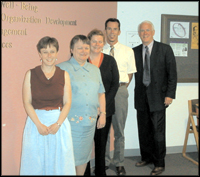information &
referral
case study
|
case study |
King County, Washington Effective Disability Services with Centralized Funding for Accommodations
The County provides
services to more than 1.7 million people and ranks as the 12th most
populous county in the nation. The county has more than 13,000 employees
across 13 departments. Disability Management Services
Disability Services in King County provides services across a number of departments to include Adult and Juvenile Detention, Assessments, Community and Human Services, King County Council, Development and Environmental Services, District Court, Office of the King County Executive, Executive Services, Judicial Administration, Natural Resources and Parks, Public Health, the Sheriff's Office, and the Department of Transportation. There are two disability services units, one specific to the Department of Transportation, the other under Safety and Claims provides disability accommodation services to all other departments. Disability
Services is under the Director of Safety and Claims, with the Claims
section being separate
(although there is close and well interwoven communication). The Claims
section has a lead
person and 9 claims officers as King County is self-insured and
self-administered for purposes Historically, and as recently as 1997, there was only one disability specialist for the entire County (this is not an unusual Northwest public sector situation as currently there is only one for the City of Seattle with 12,000 employees and one for the University of Washington). An extensive effort has been made on the part of this unit to render disability services more accessible and user-friendly to all stakeholders. This includes interactions with unions, interactions with the Prosecutor's Office for legal counsel, use of County safety officers / ergonomists for consultation, and close interaction with staff within the County's own Employee Assistance Program (EAP). The principle goal of Disability Services is
to coordinate reasonable
accommodations for County employees with disabilities. If the disability
prevents an
employee from performing their job, Disability Services facilitates
medical leave, benefits,
transitional duty, and reassignment services as needed. As requested by
Disability Services,
the long-term disability carrier CIGNA utilizes the county's job
analyses in determining vocational
capacity and eligibility for long-term disability. This approach avoids
an outdated US
Dictionary of Occupational Titles' review. The Disability Services team
maintains stringent
case standards to include 24 hour phone contact or 48 hour e-mail
contact from the date of
referral. Case notes reflect all services provided. A server-based
system is used so that all
Disability Services personnel can access all case notes thus assuring
the on-going provision It is of interest that training on The Americans with Disabilities Act is required for all County supervisors on a continuing schedule. In addition, disability awareness training is available to County employees. The training for supervisors is particularly of interest because case examples are used, it is an interactive process, and supervisors are actually required to "brainstorm" accommodation options through these case studies. There is also an effort on the part of Disability Services to take into account feedback from both supervisors and employees throughout the training offered. This is a very interactive process. In relation to disability and accommodation needs, employees definitely
have a choice. They
can approach a supervisor about their needs, seek off-site medical
resources, or talk directly
to Disability Services personnel who are housed in a confidential
setting. Workbooks have
been developed (e.g., specific to accommodation or reassignment) so that
useful information
is easily available to the worker.
For information regarding this Case Study
contact:
|
